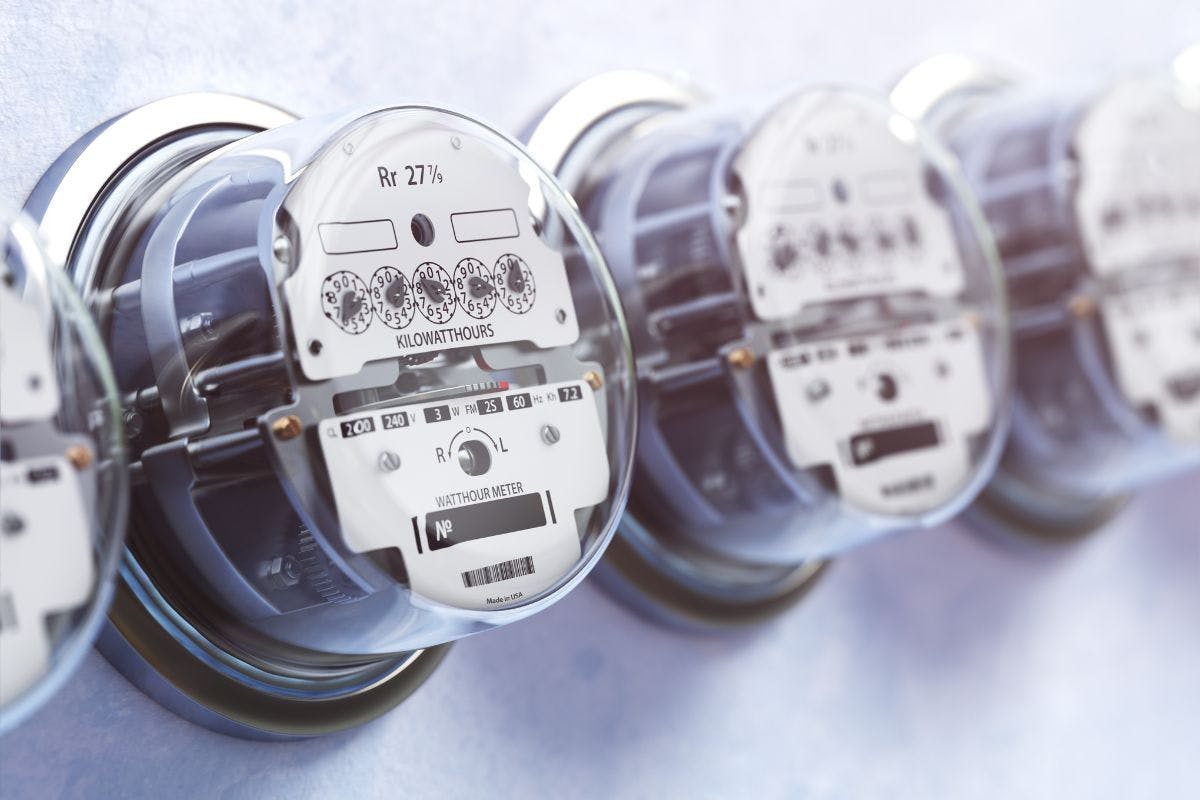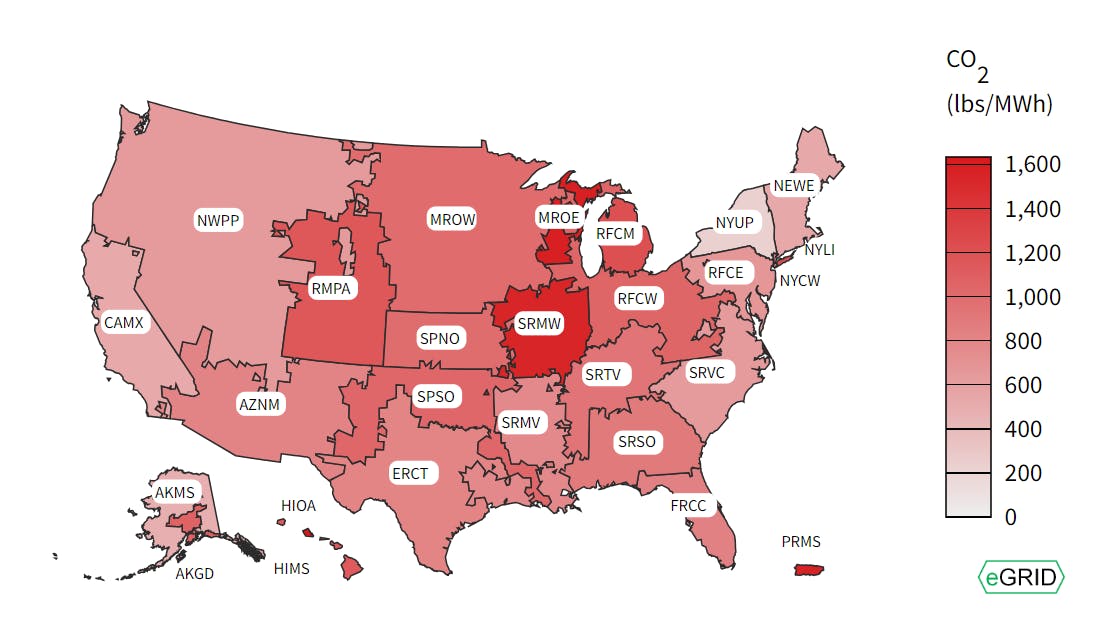Net Metering and Home Solar Panels: How it Works
Last edited
Author
Andrew Giermak
Solar and Electrification Writer and Editor
Editor
Andrew Blok
Electrification and Solar Writer and Editor

Solar panels can lower your electric bill by helping you avoid electricity from the grid. In fact, sometimes home solar panels send extra electricity to the grid.
If you don't use the electricity from your solar panels, do you lose it?
Net metering and a variety of related systems mean that you get compensated for the electricity you produce and send to the grid. The specifics of these systems vary by location. Here's what you need to know.
See how much you can save by going solar with Palmetto
How Does Net Metering Work?
When you have solar panels, you still draw some electricity from the grid. You’ll probably send some back to the grid, too, and your electric meter tracks it all.
With net metering, you’re charged for the net total you consumed or credited for the net surplus you provided to the grid. Every kilowatt-hour you send to the grid offsets one you draw from it.
Net metering examples
| From the grid to you | From you to the grid | Result |
|---|---|---|
| 100 kWhs | 50 kWhs | You pay for 50 kWhs |
| 50 kWhs | 100 kWhs | You earn 50 kWhs of credit |
| 100 kWhs | 100 kWhs | No payment or credit |
The above examples are what would happen with the most basic, one-to-one net metering. However, flavors of net metering where the math isn’t so simple also exist. These are sometimes lumped under the name net metering, when they’re more accurately called net billing or monthly net metering. More on these later.
Your net electric meter
Compared to a regular, non-solar electric meter that only measures the energy you are pulling from the grid, the electricity meter for a net-metering-enabled solar home measures in both directions.
While meters used to spin backwards when you exported electricity to the grid, newer meters are digital and can even record what time of day electricity is flowing to or from your house.

Your net metering credits
What happens if you bank more credits than you can use? Different utilities treat left over credits differently.
With most utilities, your account is trued up once a year, where your excess credits are paid out or converted to a different type of credit (often at a lower rate). Some utilities carry credits over indefinitely.
Because credits are often trued up at a lower value, it’s usually not worth installing an oversized system so you can rack up a bunch of extra credits. As a result, solar panel systems are often designed to offset your annual electricity consumption, usually by producing more than you need in the summer, and less than you need during the winter. In fact, your utility may limit your solar panel system so it only produces a certain percentage of your annual consumption (e.g. 100% or 120%).
Where Is Net Metering Available?
The net metering landscape changes as policies are updated by utilities and public utility commissions. Thirty-four states have mandatory net metering rules for some utilities (typically the larger, investor-owned ones), according to the NC Clean Energy Technology Center. Fourteen other states compensate solar owners in some other way, and two states have no net metering requirements at all.
Because rules can vary depending on where you get your electricity, confirm for yourself what rules would apply for you.
For example, if you are a Florida Power and Light customer in the Sunshine State, your net metering opportunities can be found here, on the utility’s website.

Credit: DSIRE; NC Clean Energy Technology Center
See how much you can save by going solar with Palmetto
Why Is Net Metering Important for Home Solar Panels?
Net metering makes every kilowatt-hour your solar panels produce as valuable as avoiding one kilowatt-hour of grid electricity. It increases your savings and expands the benefit of solar to future bills.
If the only way to save with solar panels was to avoid grid electricity, you’d need to concentrate your electricity usage during daylight hours, or have a large solar battery bank. Net metering requires less of the homeowner, while achieving the same results for them.
Net Metering vs. Net Billing vs. Gross Metering
Some states are shifting away from one-to-one net metering to systems that compensate solar owners with less than retail rates. There are a few different systems in use today.
Net billing (avoided-cost net metering)
With net metering, the credits you earn are valued at the price you pay for electricity. With net billing, or avoided-cost net metering, you earn a credit that’s equal to the price your utility would pay for the electricity it eventually sells to you, known as the avoided cost.
This avoided cost rate is often much lower than the retail rate you pay for electricity. Because of the technicalities of calculating the avoided cost, net billing is sometimes criticized as an opaque system that can be tilted in the utility’s favor.
Home solar panels can still be a valuable investment with net billing. In some areas with net billing, like California, it’s best to add battery storage, since avoiding grid energy is more valuable than exporting solar energy.
Gross metering
Gross metering, sometimes called buy all, sell all, is even more different. You don't consume the power generated by your solar power system directly. Instead, all of the electricity generated by your solar panels gets exported to the power grid, and then you pull the electricity you require back from the grid.
Gross metering requires an extra electricity meter to measure the electricity you generate, while the regular meter records the electricity you consume. You are paid a predetermined feed-in tariff rate for the power sent to the grid from your solar power system, and this feed-in tariff rate helps offset the cost of power you use.
Does Net Metering Save Money?
With net metering, you can cover more of your electricity costs that you could without. That saves you money.
Your savings might vary season to season thanks to changes in your solar panels’ production, called solar seasonality, and changes in your electricity consumption.
In the winter months, your solar panels will generate less electricity while your heat pump might run more frequently. If your solar panels switched on for the first time in January, you may not see the savings you were expecting. However, come the summer months your panels could be producing more electricity than you need and building your bank of credits. Next January, you may have credits remaining to cover part or all of your bill.
All that means it can take some time to see net metering savings after your panels first turn on.
What Are the Benefits of Net Metering?
Net metering can help you save on your utility bill, shorten your solar payback period, let the grid act as your backup battery, and reduce pressure on the grid. Let's take a look at each of those net solar metering benefits in more detail.
Save on your utility bill
Savings continues to be the leading reason homeowners go solar. Net metering can boost those savings.

Source: EPA
Speed up your payback period
By increasing your savings, net metering can shorten your solar payback period, the amount of time it takes for the savings from solar to match the cost of your solar panels. Once you’ve reached the end of your payback period, you’ve paid off your initial investment, and any electricity generated after that point is essentially “free.”
Your solar payback period will depend on several factors in addition to net metering status.
- The price of electricity in your area
- The size of your system
- Tax credits and other incentives
- Your electricity usage
- The cost of installation
The grid acts like a backup battery
With net metering, your utility company is essentially allowing you to use the grid as a virtual battery to store excess power for later use. Think of it like a battery you don't see, but works when you need more power.
Without net metering, the only way to get value from extra electricity your solar panels produce is a solar battery, which requires a larger upfront investment.
Reduces pressure on the grid
Net metering incentivizes homeowners to share their extra solar electricity with the grid. At a time when demand for electricity is rising, additional electricity can be a valuable support to the grid, especially during peak hours of electricity demand.
The Future of Net Metering
Changes to net metering have occurred around the country. California changed its policy in 2023 and set off a flurry of solar installations as people rushed to lock in the earlier and more generous policy. Illinois changed its policy at the start of 2025. In both states, the newer policy will still be beneficial to homeowners going solar, but not quite as generous as the previous one.
When changes to net metering occur, systems installed under a previous, more generous system may get to keep the existing rate. This occurred in Illinois and California during the most recent changes in those states. Since the rules are set at the state level, grandfathering can’t always be guaranteed.
It’s important to know how net metering affects the financial calculation you make when going solar, especially as policies are changing.
To see how net metering policies in your region can affect your solar savings, contact Palmetto today.
See what solar can do for you:
Net Metering FAQs
What does net metering mean?
Net metering awards solar panel owners bill credits that offset one kilowatt-hour of electricity on their bill for every kilowatt-hour they send to the grid. Under true net metering, electricity exported to the grid is worth the same as electricity you buy. Systems with bill credits worth less than the value of purchased electricity are sometimes inaccurately called net metering.
How does net metering save you money?
Net metering can save you money by generating bill credits that can be used to offset the cost of electricity you buy from the grid.
Will I have an electric bill with net metering?
You’ll still receive an electric bill when you go solar, and it will change throughout the year as you generate and use more or less electricity. Even in months where your bill shows a balance of zero (that may not be possible in some jurisdictions), you’ll still receive one to track your net metering credits.
What is NEM 3.0?
NEM 3.0 — short for net energy metering 3.0 — is the third iteration of net metering for California’s investor-owned utilities. It’s technically a net billing system and generated significant controversy when it was approved and implemented over the amount bill credits were reduced.
Is net metering going away?
Some states and utilities have moved to systems that are less lucrative than 1-to-1 net metering. No one can predict the future, but it seems 1-to-1 net metering is becoming less common.
Will I receive a check from my utility company if I have solar panels?
You might receive an annual payout of your net metering credits called a true-up payment. Typically, any excess credits are paid out at a rate lower than the retail rate. Some regions don’t have true-up payments and instead have credits roll forward indefinitely. Because rules may vary from place to place, check with your utility or a knowledgeable solar installer about your local regulation.


